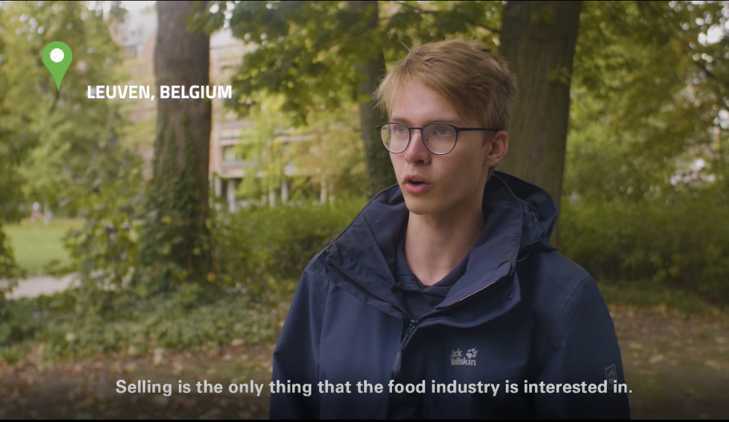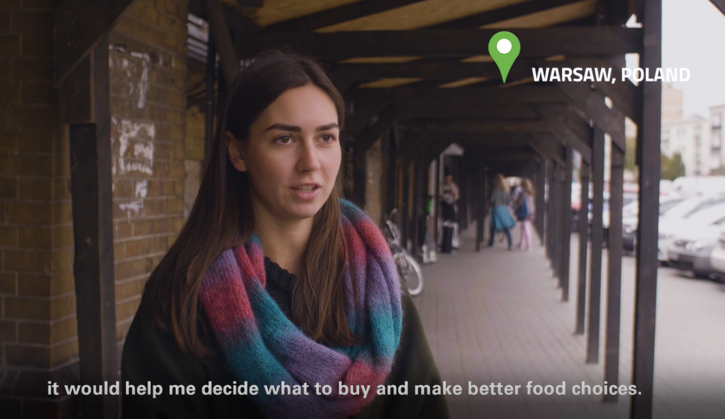Can I trust the food industry to provide healthy and sustainable food?
Quiz time. Answer the following question – Does the food industry produce healthy and sustainable food for me to eat?
- Yes
- No
- I’m not sure
Have you chosen your answer? Read the post to help you decide.
Why do we trust farmers the most in the food industry?
For most of us it is important that we can trust the food that we eat. We want to know that our food is healthy, is produced sustainably and is safe for our consumption. However, a recent FoodThink study has found that almost half of consumers who frequently buy food for their households do not trust the food industry to do the right thing, and nearly a quarter actively distrust it.
However, the food industry is made up of many key players, so who is it that consumers do, and do not trust? EIT Food’s Trust Tracker recently asked 11,000 consumers across 13 European countries to rate their levels of trust in farmers, food manufacturers, retailers and authorities. They found that:
- Farmers were voted the most trusted players in the food industry because they listen to the public and are somewhat open and honest.
- Food manufacturers and authorities are less trusted because the perception is that they do not always listen to consumers and are not open nor honest about food production.
- Food retailers and food manufacturers need to be more transparent and overall farmers and food manufacturers are doing a good job.
As such, it is evident that consumers have different levels of trust for different actors within the food industry. While the industry has a long way to go to overcome low consumer trust, it’s projects like the EIT Food Trust Tracker that is giving consumers a voice to express their views and concerns.

The strengths and weaknesses of our food system: consumers have their say
When buying food many of us consider different things. For example, many of us think about how healthy the product is, how much it costs, where it was produced, and how fresh it is, amongst many other factors.
We asked consumers across Europe to tell us whether they trust the food industry to meet their needs. Watch the video to hear what they had to say:

Many consumers explained why they do not trust the food industry. For example, one consumer suggested that, “selling is the only thing the food industry is interested in”, while another explained how their need for affordable and high-quality food is not being met.
However, others suggested that the food industry is meeting their needs. One consumer believed that “we receive high quality food”, while another felt that food producers are making, “a bit more effort to be transparent about ingredients”.
Alternative Proteins: Should we be worried or excited?
Buying food that is healthy and sustainable is important to many of us and there are signs that the food industry is listening to what consumers want. For example, more people are demanding plant-based proteins that are believed to be healthier and more environmentally friendly than animal-based proteins.
We asked consumers what they thought about the future of protein, as alternative proteins and even insects start to emerge on our supermarket shelves. Watch the video to hear what they had to say:

Many consumers believe the food industry is starting to offer alternatives to animal-based proteins which are both healthy and sustainable. For example, one consumer explained, “I’ve tried so-called vegan burgers, some of them are really tasty”, while another commented, “if insects are available in supermarkets…then I would definitely buy them”.
However, not all consumers were convinced. For example, one suggested that insect-based and plant-based proteins did not sound appetising while another consumer admitted, “insects scare me a little”.
While it appears that many consumers are cautious about eating alternative proteins, the industry is listening to the consumers who do want to see more plant-based and insect-based options on offer, suggesting they are considering the health and environmental implications of what they produce.
But, the food industry isn’t perfect
Despite efforts to deliver healthier and more sustainable food to consumers, the industry still needs to adapt. For example, the EIT Food Trust Tracker found that there is a lack of transparency and openness from the industry, which causes high levels of consumer distrust. Consumers want to know more about where their food comes from and what is in it. For example, many want to be able to trace their food back to its source and have a clearer understanding of the ingredients included.
Some believe that a more digitalised food production process would ensure a more open and transparent journey for food, from fark to fork.
We asked consumers whether they believed a digitalised food system would help them make more informed food choices. Here’s what they had to say:

For many, they believed an increased digitalised food industry, where people could see the journey of their food from farm to fork, would be useful when determining what foods to buy. Do you agree?
How can I influence the food industry so that it delivers healthy and sustainable food?
As consumers, we can shape the future of the food industry. We can do this by:
- Buying the foods we want – consumer demand influences what foods are produced. By buying the types of food we want to see more of, producers will listen and respond
- Learning more about how the food industry works. For example, EIT Food’s free online courses provide an opportunity for consumers to gain the knowledge and skills needed to make healthier and more sustainable food choices
- Supporting those who want a healthier and sustainable food system for all – for example, get involved with us at EIT Food.
The videos in this article were produced for EIT Food’s Future of Food conference, which bought together policymakers and food innovation experts from across Europe to discuss the future of food. To learn more, click here
More blog posts

From Pitch to Plate: How Football Is Addressing Food Waste

